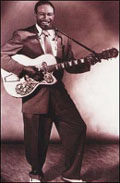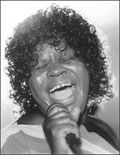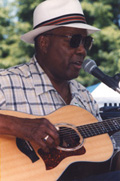Big Boss Man
 |
This song is strongly identified with bluesman Jimmy Reed (shown right), but it was written by his manager, Al Smith (a fine jazz-influenced blues singer in his own right), and Luther Dixon (who wrote many hit songs for the Shirelles and other artists). The stomp-time shuffle rhythm they used to accompany the song has become one of the signature beats of rock and blues guitar. One essayist at All Music calls it the beat that launched a thousand hits, and it's one that every guitarist—acoustic or electric—should have under his or her fingers.
One of the things that makes for a great jam tune is accessibility and if Jimmy Reed's music is anything, it's accessible. It had to be, since he himself was neither an accomplished singer or guitarist. To quote Billy Vera's liner notes to one Reed anthology: Anybody with a range of more than six notes could sing Jimmy's tunes and play them the first day Mom and Dad brought home that first guitar from Sears & Roebuck. I guess Jimmy could be termed the '50s punk bluesman.
However the critics may assess his abilities, Reed stands among the most commercially successful and influential blues musicians of all time. Many of his own songs—including Baby What You Want Me To Do? and Bright Lights, Big City—have become standards and hit records for not only blues musicians but all sorts of cross-over artists from Elvis Presley to Charlie Rich. Here's Jimmy himself performing Big Boss Man in 1960 with Mama Reed helping out on vocals:
Audio Clip: Jimmy Reed on Big Boss Man
 |
The bass player on that cut was another giant of 20th century blues, songwriter and producer Willie Dixon. Among his many other credits, Dixon played a critical role in launching Koko Taylor's career—producing her first single and penning her first huge hit, "Wang, Dang Doodle"—thus helping one sharecropper's daughter make the transition from housemaid to the (still reigning) "Queen of the Chicago blues". She cut Big Boss Man on her 1973 album, South Side Lady. Not to distract you from Koko's big, boss vocals (a hopeless effort for anyone) but before she starts, check out how the guitarist interprets the shuffle.
Audio Clip: Koko Taylor sings Big Boss Man
The Grateful Dead performed this song virtually the full length of their long, strange trip together. This version is from a live performance in 1995 at the Riverport Theater in Maryland Heights, MO, just a month before Jerry Garcia's death. They take the tune a little slower than most and it's a great groove. The clip I've selected is Jerry's two-chorus solo because it illustrates so well two things I'm always nudging students of lead guitar to keep in mind. First, that a solo does not have to be fast or fancy to be effective—listen to the spaces between the notes in this solo. And second, that the melody of a song is a great resource to work with when building a solo. The first time through here, Garcia is clearly "singing" the chorus in his head, sometimes quoting the melody, sometimes just echoing its phrasing. On his second pass he does the same thing, but now what he has in mind is the verse ("Got me working boss man / Working round the clock", etc). While building a solo from nothing but riffs and cliches is fine and fun in many circumstances, it's refreshing to hear this kind of musicality, especially on a blues tune. Check it out:
Audio Clip: The Grateful Dead performing Big Boss Man
 |
Finally, here's an acoustic treatment of the song by a contemporary duo known not for Chicago blues, but what's known as Piedmont blues, Cephas and Wiggins. Piedmont blues features fingerstyle guitar, most often with an alternating bass played with the thumb undergirding the melody, which is played with one or more fingers. On this song, however, "Bowling Green" John Cephas (shown right) is laying down the shuffle with his thumb instead, only breaking into an alternating bass occasionally (listen for it on what would be the E7 in our arrangement). Our clip includes their openning instrumental so you can hear this more clearly. It is taken from a live performance at the American Folk Blues Festival in 1982.
Audio Clip: John Cephas (guitar) and Phil Wiggins (harmonica) on Big Boss Man.
Recommended Recordings
All Community Guitar Resources text & material © 2006 Andrew Lawrence
